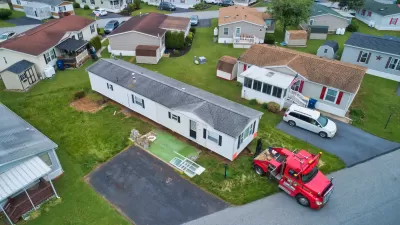After declaring a housing crisis, the Virginia capital’s city council voted against a proposed manufactured home warehouse that would distribute replacements for aging manufactured housing stock.

A proposed manufactured housing project was denied a permit in Richmond, Virginia, despite a growing housing crisis in that city, one so severe it was officially recognized by the city council just two weeks prior to the project’s rejection.
As Wyatt Gordon explains in Greater Greater Washington, “Beyond the details of the drama between 9th District Councilmember Mike Jones — a rising star in the commonwealth’s Democratic Party — and one of Richmond’s premier housing nonprofits, the impasse boiled down to whether a warehouse should be sited next to single-family housing. The lot Project:HOMES hoped to turn into a production facility for manufacturing affordable mobile homes is currently zoned R-3, not industrial.” Jones expressed concerns about industrial uses in low-income neighborhoods.
A 2016 report from the Manufactured Home Community Coalition of Virginia found that less than half of the state’s mobile home parks scored more than 50 percent on housing quality indicators. “With Project:HOMES’ plans for an innovative facility to manufacture replacement units rightly or wrongly now on ice, the problem of substandard housing across the region’s mobile home parks persists.”
Neighboring communities could step in. “Since City Council shot down the warehouse’s initial Southside location, Project:HOMES has heard from the neighboring counties of Henrico and Chesterfield who would be more than happy to find a site for a model affordable housing nonprofit looking to grow.”
FULL STORY: The manufacture of affordable housing bumps up against Richmond’s inequitable zoning

Alabama: Trump Terminates Settlements for Black Communities Harmed By Raw Sewage
Trump deemed the landmark civil rights agreement “illegal DEI and environmental justice policy.”

Study: Maui’s Plan to Convert Vacation Rentals to Long-Term Housing Could Cause Nearly $1 Billion Economic Loss
The plan would reduce visitor accommodation by 25% resulting in 1,900 jobs lost.

Planetizen Federal Action Tracker
A weekly monitor of how Trump’s orders and actions are impacting planners and planning in America.

Waymo Gets Permission to Map SF’s Market Street
If allowed to operate on the traffic-restricted street, Waymo’s autonomous taxis would have a leg up over ride-hailing competitors — and counter the city’s efforts to grow bike and pedestrian on the thoroughfare.

Parklet Symposium Highlights the Success of Shared Spaces
Parklets got a boost during the Covid-19 pandemic, when the concept was translated to outdoor dining programs that offered restaurants a lifeline during the shutdown.

Federal Homelessness Agency Places Entire Staff on Leave
The U.S. Interagency Council on Homelessness is the only federal agency dedicated to preventing and ending homelessness.
Urban Design for Planners 1: Software Tools
This six-course series explores essential urban design concepts using open source software and equips planners with the tools they need to participate fully in the urban design process.
Planning for Universal Design
Learn the tools for implementing Universal Design in planning regulations.
Caltrans
Smith Gee Studio
Institute for Housing and Urban Development Studies (IHS)
City of Grandview
Harvard GSD Executive Education
Toledo-Lucas County Plan Commissions
Salt Lake City
NYU Wagner Graduate School of Public Service





























